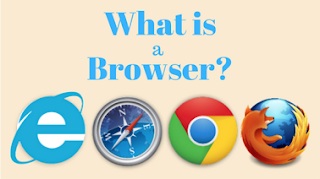 Our members most typically communicate
with DKG via the Internet. Browsing the Internet is a common, daily occurrence
for most people. Have you ever considered why they call it browsing? It is
because you use an internet browser, also know as a Web browser.
Our members most typically communicate
with DKG via the Internet. Browsing the Internet is a common, daily occurrence
for most people. Have you ever considered why they call it browsing? It is
because you use an internet browser, also know as a Web browser.
A browser is simply a software program that you use to
access the internet and view web pages on your computer, smartphone, or tablet.
It is the gateway to the Internet.
The original browser, Mosaic (1992) was
not graphical. It was text-based. Browsers have come a long way since then. You
now have powerful browsers that let you safely and quickly access your favorite
websites.
Most browsers are available for free
download. The four most popular Internet browsers today include Mozilla Firefox, Google Chrome, Microsoft
Edge, and Apple Safari.
Each has its own strengths and
weaknesses. Because some websites display better in one Internet browser or
another, many people have at least two browsers available on their computer,
smartphone, or tablet. These strengths and weaknesses are discussed in more
detail below.
Choosing
a Browser to Suit Your Needs
When you surf the Web, you use one of the
many browsers available. A browser is the way you navigate the World Wide Web.
In most instances, you begin with the browser that came with your computer.
Older Windows computers gave you Internet Explorer, while updates gave you
Edge. If you use an Apple product, you started with Safari. In this blog we
will take a look at Edge, Safari, and others. Because Microsoft no longer
supports Internet Explorer, it will not be discussed.
Microsoft
Edge resembles Internet Explorer 11, so
Windows users will feel comfortable with it. It fully integrates with Windows
10. For users who want and use extensions--which extend your Web
browser with additional features, modify Web pages, and integrate your browser
with the other services you use--Edge doesn’t allow for much customization.
Syncing with your Android or iOS device isn’t straightforward. Microsoft has
sandboxed Edge away from the operating system to limit security breaches that
occurred with Internet Explorer. (Sandboxing is a computer security term
referring to when a program is set aside from other programs in a separate
environment so that if errors or security issues occur, those issues will not
spread to other areas on the computer.)
Apple
Safari is a Web browser available for the
Macintosh operating system as well as the iPhone, iPod Touch, and iPad.
According to Apple, Safari has been designed based on the premise that the most
useful browser is one that "gets out of your way and lets you simply enjoy
the Web.” If you own several Apple products, synchronization of passwords,
bookmarks, history, tabs and Reading List happen seamlessly through iCloud. Like Edge, Safari is sandboxed. In general, Safari runs a bit faster than other
browsers on an Apple device.
Google
Chrome has a robust set of features, with full
Google Account integration, and a suite of mobile apps for every major
platform. It does have privacy and security controls. By some accounts, Chrome
is the gold standard for web browsers. Chrome’s integration of its products is
second to none.
Mozilla
Firefox has been on a roller coaster of
popularity over the years. Firefox is available for Linux, Mac, Windows,
handheld devices, and in more than 70 different languages. Firefox is developed
by the nonprofit, public-benefit organization Mozilla and thousands of
volunteers worldwide. Since 1998, Mozilla has been working to help create and
sustain an open and accessible Internet for all, and its focus is on
individuals, not profits. Recent updates have once again pushed Firefox into
the limelight of a preferred browser. It provides secure connections and
browsing protections.
Choosing: Start with the one that came with your computer or smart phone/tablet.
If it does everything you want and need, go no further. If however, you are
like most users, you will eventually have a reason to switch. Download the one
or two that interest you. They are free.
For example, this particular blogger
personally has Safari, Chrome, and Firefox on her computer. She uses each one
for different tasks. If she is working in the Google world, she uses Chrome.
Safari doesn’t like sites that use Flash (helps with animations), so she uses
Firefox or Chrome. The blogger accesses this blog via Firefox but accesses the
draft of the next post via Chrome (draft is in Google docs). For general
browsing, she uses Safari.




.jpeg)
No comments:
Post a Comment